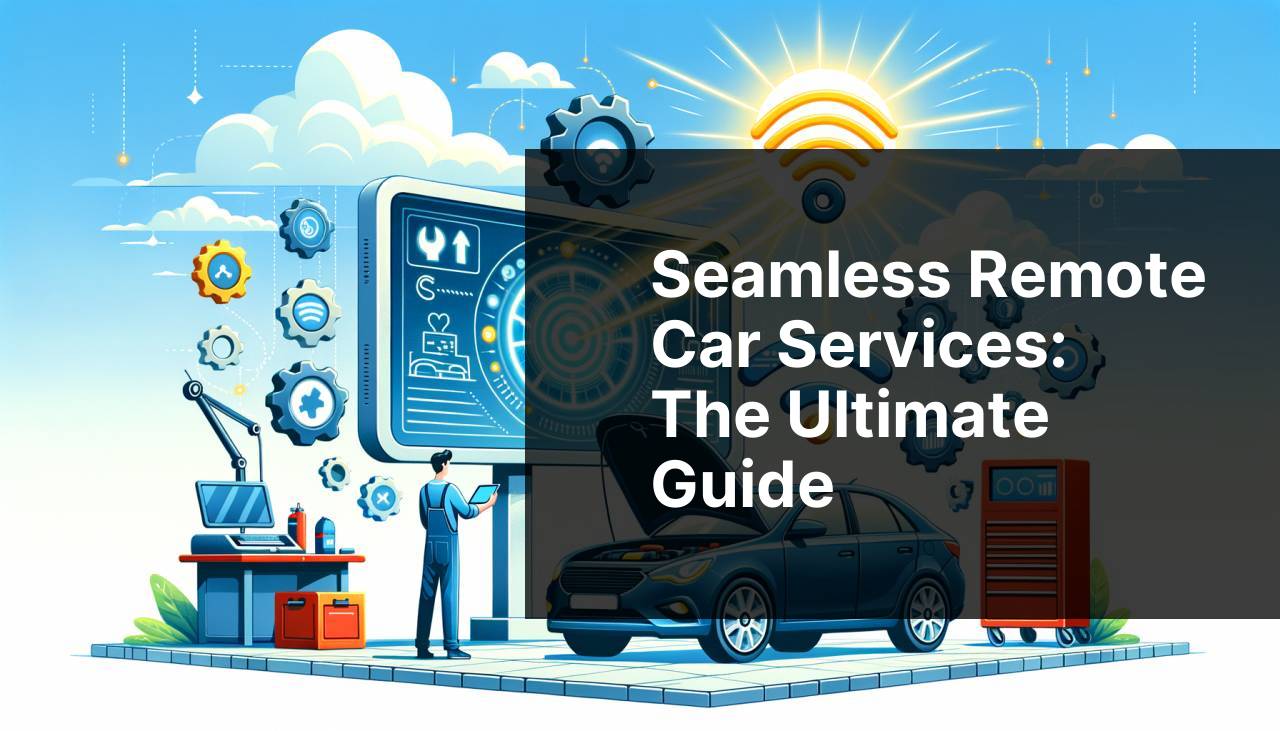Seamless Remote Car Services: The Ultimate Guide

In an era where everything is becoming increasingly digital, the automotive industry is not left behind. The idea of ‘remote car services’ and ‘remote diagnostics’ has revolutionized the way we interact with our vehicles. Imagine diagnosing your car’s engine issues while sitting on your couch, or getting your vehicle’s software upgraded without having to visit the dealership. These scenarios have become possible thanks to technologies like FlexiHub, a solution that allows mechanics to access your car’s OBD (On-Board Diagnostics) port remotely.
Common Scenarios:
Vehicle Breaking Down in a Remote Area 🚗
- Your car can break down in a remote area where accessing immediate help is challengeable. Using remote diagnostics, mechanics can diagnose the problem through the remote OBD port and potentially guide you on how to fix it or ascertain whether a tow is needed.
Flashing Check Engine Light 🚨
- It’s frustrating when the check engine light comes on with no clear indication of what’s wrong. With remote services, a professional can diagnose the issue through the OBD port without you needing to bring your car to the shop.
Regular Maintenance 🚗
- Keeping up with regular maintenance can be challenging with a busy schedule. Remote services can help maintain your vehicle’s software and settings by accessing the OBD port without you having to be physically present at a service center.
Step-by-Step Guide. Remote Car Services And Remote Diagnostics:
Method 1: Using FlexiHub for Remote Access 🚗
- First, download and install FlexiHub on both the mechanic’s and your computer. This software facilitates remote connections over the internet.
- Sign up for an account on the FlexiHub website. This account will be used to manage your connections.
- Connect the OBD-II scanner to your car and then attach it to your computer through a USB port.
- Launch FlexiHub, log in, and share your OBD scanner so that the mechanic can detect it remotely.
- The mechanic can now use their tools to run diagnostics remotely and guide you through any necessary steps.
Note: Ensure you have a stable internet connection for uninterrupted service.
Conclusion: FlexiHub simplifies remote car diagnostics by providing easy access to the OBD port.
Method 2: Using TeamViewer 📱
- Download and install TeamViewer on both the vehicle owner’s and mechanic’s computer.
- Create a free account on the TeamViewer website to facilitate remote connection.
- Connect the OBD-II scanner to the car and attach it to the owner’s computer.
- Launch TeamViewer and share the login credentials with the mechanic to establish a remote session.
- The mechanic can now run diagnostics through the remote interface and provide solutions or next steps.
Note: Always use the latest version of the software for optimal performance and security.
Conclusion: TeamViewer allows for easy and efficient remote diagnostic services by providing access to your computer and OBD-II scanner.
Method 3: Using AnyDesk 📞
- Install AnyDesk on both your and the mechanic’s computer for remote access.
- Sign up for a free account to enable remote connections.
- Connect the OBD-II scanner to your car and your computer.
- Launch AnyDesk and share your remote access code with the mechanic.
- The mechanic can now remotely access your computer and run necessary diagnostics on the vehicle.
Note: Keep your software up-to-date to take advantage of the latest features and security patches.
Conclusion: AnyDesk provides a straightforward way for mechanics to perform remote diagnostics by accessing your computer.
Method 4: Using RemotePC 🖥
- Download and install RemotePC on both your and the mechanic’s computer system.
- Create an account on the RemotePC website.
- Connect the OBD-II scanner to your car and attach it to your computer.
- Launch RemotePC and share your access credentials with the mechanic.
- The mechanic can now access your system and use the OBD-II scanner for diagnostics.
Note: Make sure the internet connection is stable for efficient diagnostics.
Conclusion: RemotePC enables effective remote diagnostics by granting access to the OBD-II scanner connected to your computer.
Method 5: Using Google Chrome Remote Desktop 🌐
- Install the Google Chrome Remote Desktop extension on your Chrome Browser.
- Set up remote access by following instructions on the Google Chrome Remote Desktop site.
- Connect your OBD-II scanner to your car and your computer.
- Provide the access code generated by Google Chrome Remote Desktop to your mechanic.
- The mechanic can then handle the diagnostics process remotely by accessing your computer.
Note: Ensure both parties use the same version of Chrome for seamless operation.
Conclusion: Google Chrome Remote Desktop is a free, easily accessible tool for remote car diagnostics.
Watch on Youtube: Seamless Remote Car Services: The Ultimate Guide
Precautions and Tips:
Safety Measures While Using Remote Services 🔒
- Always ensure that you’re sharing access credentials only with trusted professionals to avoid unauthorized access.
- Maintain a stable and secure internet connection to ensure consistent connectivity during the diagnostic process.
- Regularly update all software and tools used for remote access to benefit from the latest features and security improvements.
- Keep your OBD-II scanner and related hardware in good condition to prevent issues during diagnostic tests.
Additional Resources
Understanding the advancements in remote car services and remote diagnostics can significantly ease the burden of maintaining a vehicle, especially for those with tight schedules or living in remote areas. With tools like FlexiHub, mechanics can now connect to vehicles remotely, allowing for real-time diagnostics and troubleshooting.
FlexiHub is an essential tool in this arsenal. Its ability to create a virtual network makes it easier for mechanics to access the vehicle’s OBD-II port without being physically present. This guide can provide more information on how to set up and use FlexiHub.
Other software solutions such as TeamViewer, AnyDesk, and RemotePC offer alternative means for achieving the same goal. Each of these tools has its strengths and can be used effectively depending on your specific needs.
The functionality offered by these tools does not replace professional diagnostics and repair but serves as a first line of troubleshooting, enabling mechanics to gather crucial information before further intervention is needed. It’s important to consult experienced mechanics when using remote diagnostic tools to ensure accurate and effective diagnostics.
The broader adoption of these technologies is transforming automotive services, making them more efficient and convenient. By leveraging these remote diagnostic tools, you can save time and potentially reduce repair costs. Regular maintenance, updates, and the ability to swiftly diagnose issues all contribute to the longevity and reliability of your vehicle.
Conclusion:
FAQ
How does remote diagnostics work for modern cars?
Remote diagnostics involve connecting your car’s onboard computer to a remote service which analyzes data to identify issues without needing a physical visit.
Are remote car services secure and reliable?
Yes, they use encrypted connections and secure protocols, making them as reliable as traditional diagnostics but more convenient.
What type of issues can remote diagnostics identify in a vehicle?
They can detect engine problems, battery health, transmission issues, and even tire pressure discrepancies.
Is it possible to access remote car services through a mobile app?
Yes, many service providers offer mobile apps for easy access and control of remote diagnostics and other features.
Do remote diagnostics work on older car models?
They primarily work on cars equipped with an OBD-II port, commonly found in vehicles manufactured after 1996.
Can remote car diagnostics predict future breakdowns?
Advanced systems can analyze patterns and data trends to provide predictive maintenance alerts.
Are there costs associated with remote car diagnostics services?
Some providers include this in their service plans, but others may charge a fee per diagnostic session.
How do remote car services save time and money?
They eliminate the need for frequent physical visits to a mechanic, allowing for quicker identification and cheaper fixes of issues.
Can remote diagnostics be used for electric vehicles?
Yes, they can monitor the battery and other critical systems specific to electric vehicles, enhancing operational safety.
